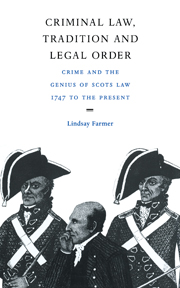Book contents
- Frontmatter
- Contents
- Acknowledgements
- 1 The boundaries of the criminal law: criminal law, legal theory and history
- 2 The genius of our law: legality and the Scottish legal tradition
- 3 The judicial establishment: the transformation of criminal jurisdiction 1747–1908
- 4 The ‘well-governed realm’: crime and legal order 1747–1908
- 5 The perfect crime: homicide and the criminal law
- 6 Conclusion: crime and the genius of Scots law
- Bibliography
- Index
4 - The ‘well-governed realm’: crime and legal order 1747–1908
Published online by Cambridge University Press: 08 January 2010
- Frontmatter
- Contents
- Acknowledgements
- 1 The boundaries of the criminal law: criminal law, legal theory and history
- 2 The genius of our law: legality and the Scottish legal tradition
- 3 The judicial establishment: the transformation of criminal jurisdiction 1747–1908
- 4 The ‘well-governed realm’: crime and legal order 1747–1908
- 5 The perfect crime: homicide and the criminal law
- 6 Conclusion: crime and the genius of Scots law
- Bibliography
- Index
Summary
After this… follows the major proposition of the libel, which names, or at least describes the crime, and characterizes it as one which, by the law of this and all other well-governed realms, is accounted a heinous crime and severely punishable.
Introduction
It tends to be assumed that the substance of the criminal law is something that is relatively stable. There is said to be a basic ‘core’ of crimes, comprising homicide, rape, theft and so on, that remains unchanged, protecting certain fundamental social values such as human life and property. Equally, it is assumed that the law has always recognised that the question of guilt or moral blameworthiness was bound to the intention of the accused person. Even if this were so, and it is an overly simple account of the law, it tells us very little indeed about criminal jurisdiction at a particular place or time. We do not know, for example, what actions were included within these broad categories or how liability was attributed for these actions. Such issues can only be determined by examining the theoretical and practical limits governing the application of the rules. Different patterns emerge in the attribution of criminal liability, and the overall significance of certain crimes within the criminal justice system changes over time.
The issue that this raises, then, is not so much the question of the values that the law seeks to protect, but one of how crime is perceived and prosecuted.
- Type
- Chapter
- Information
- Criminal Law, Tradition and Legal OrderCrime and the Genius of Scots Law, 1747 to the Present, pp. 100 - 141Publisher: Cambridge University PressPrint publication year: 1996



